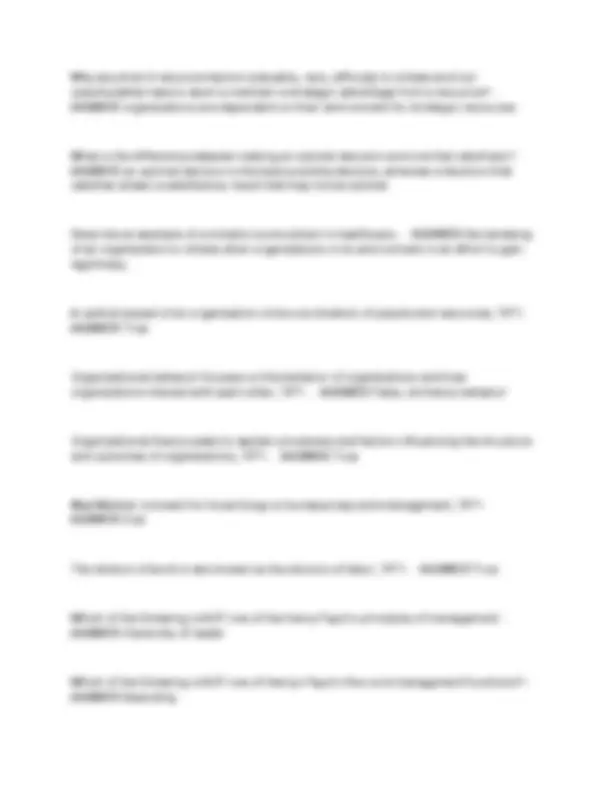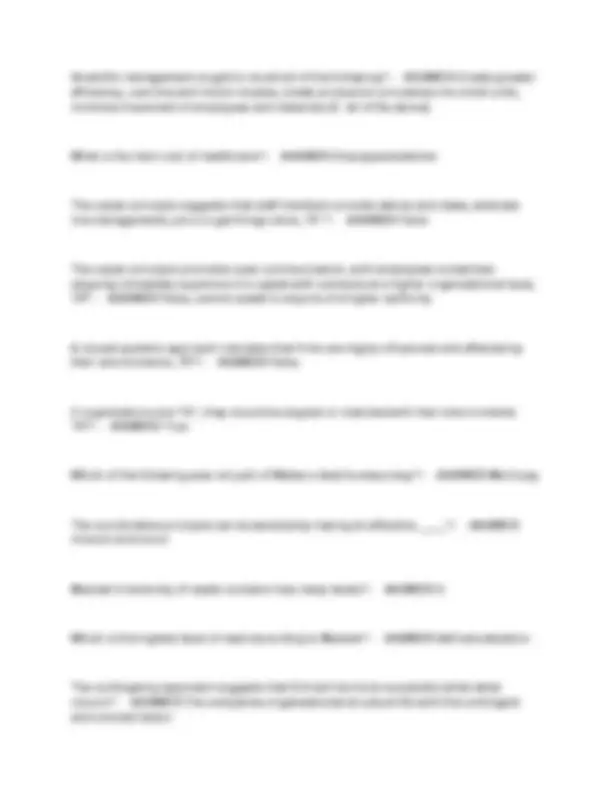





Study with the several resources on Docsity

Earn points by helping other students or get them with a premium plan


Prepare for your exams
Study with the several resources on Docsity

Earn points to download
Earn points by helping other students or get them with a premium plan
Community
Ask the community for help and clear up your study doubts
Discover the best universities in your country according to Docsity users
Free resources
Download our free guides on studying techniques, anxiety management strategies, and thesis advice from Docsity tutors
A series of questions and answers related to organizational management in healthcare, covering topics such as organizational theory, behavior, and principles of management. It explores concepts like bureaucracy, hierarchy of needs, contingency approach, and open systems theory, offering insights into the complexities of managing healthcare organizations.
Typology: Exams
1 / 5

This page cannot be seen from the preview
Don't miss anything!




What are some of the challenges that make organizational management in healthcare more complex than in many other industries? - ANSWER Professionalization, transformation and constant changes, nature of customers, multiple specialties with different cultures
why are organizations important in our lives? - ANSWER everyone belongs to an organization, they are used to increase efficiency and effectiveness
What are the precursors to the development of organizational theory and organizational behavior? - ANSWER work by webber fayle and scientific management focused on improving the work setting
What did max webber and fredrick Taylor mostly miss in their choices? - ANSWER they missed the impact of human nature and its effect on work
What is the difference between organizational behavior and organizational theory? - ANSWER the study of organizational behavior focuses on individual and group functions whereas organizational theory focuses on interactions and behaviors of individuals and groups
why did the industrial revolution in the late 1800 affect work relationships so greatly? - ANSWER new technologies allow large factories which require new ways to organize and manage
what events encourage managers to seek means to address the human influence on work? - ANSWER advanced psychology that's off unionization growing urbanization the Great Depression and world war
How might the components and application of the principles of bureaucracy in public health agency benefit the community? - ANSWER the set standard processes and ways
for everyone to do things, they hire based on advancement rather than personal connectionists, seek specialization, and maximize efficiency
What is the hierarchal structure? - ANSWER refers to a company chain of command, arranged in order of rank
How does the coordinative principles differ from the scalar principle?How could they conflict? - ANSWER The coordinate principle describes an orderly arrangement of a groups effort, creating unity of action to seek a common objective, while the scalar principle subordinates at each level communicate only through a chain of command to their immediate supervisor
Maslow divided human needs into five categories and contended that lower level needs have to be met before someone can achieve the highest need of self actualization. Describe a situation in which this hierarchy holds. Describe one in which it might not hold. - ANSWER Situations of self sacrificing often demonstrate higher needs being met at the expense of lower needs.
Would a manager with a theory x perception of workers give more or less responsibility to employees? - ANSWER Probably less responsibility, as the manager would believe the employees are inherently lazy
Theory X managers : tend to supervise closely and have a strict control system
The contingency approach suggests that a firm will be more successful when what occurs? - ANSWER firms fit or match the environment
Open systems theory suggest that the external environment affects a company ability to function. identify any similarities between the contingency approach and open systems theory? - ANSWER they both focus on organization, structure, and behavior
both deal with the external environment and how it interacts with the successful operations of a company
Scientific management sought to do which of the following? - ANSWER Create greater efficiency, use time and motion studies, break production processes into small units, minimize movement of employees and materials (E: all of the above)
What is the main cost of healthcare? - ANSWER Employees/salaries
The scalar principle suggests that staff members provide advice and ideas, whereas line managements job is to get things done, T/F? - ANSWER False
The scalar principle promotes open communication, with employees sometimes skipping immediate supervisors to speak with someone at a higher organizational level, T/f? - ANSWER False, cannot speak to anyone of a higher authority
A closed systems approach indicates that firms are highly influenced and affected by their environments, T/F? - ANSWER False
If organizations are "fit", they should be aligned or matched with their environments T/F? - ANSWER True
Which of the following was not part of Webers ideal bureaucracy? - ANSWER Merit pay
The coordinative principle can be assisted by having an effective _____? - ANSWER mission and vision
Maslow's hierarchy of needs contains how many levels? - ANSWER 5
Which is the highest level of need according to Maslow? - ANSWER Self-actualization
The contingency approach suggests that firm will be more successful when what occurs? - ANSWER The companies organizational structure fits with the contingent environment factor
key word: environment
How might ethnocentrism create problems for an organization? - ANSWER It can lead to segregation, racism, discrimination, and rejection to other ideas